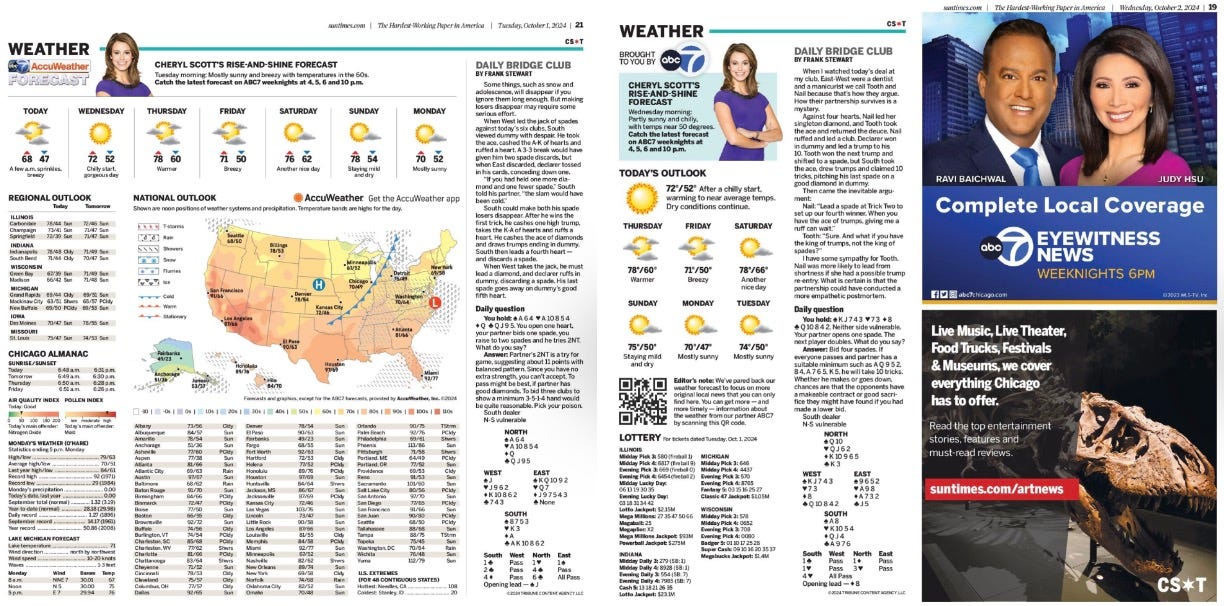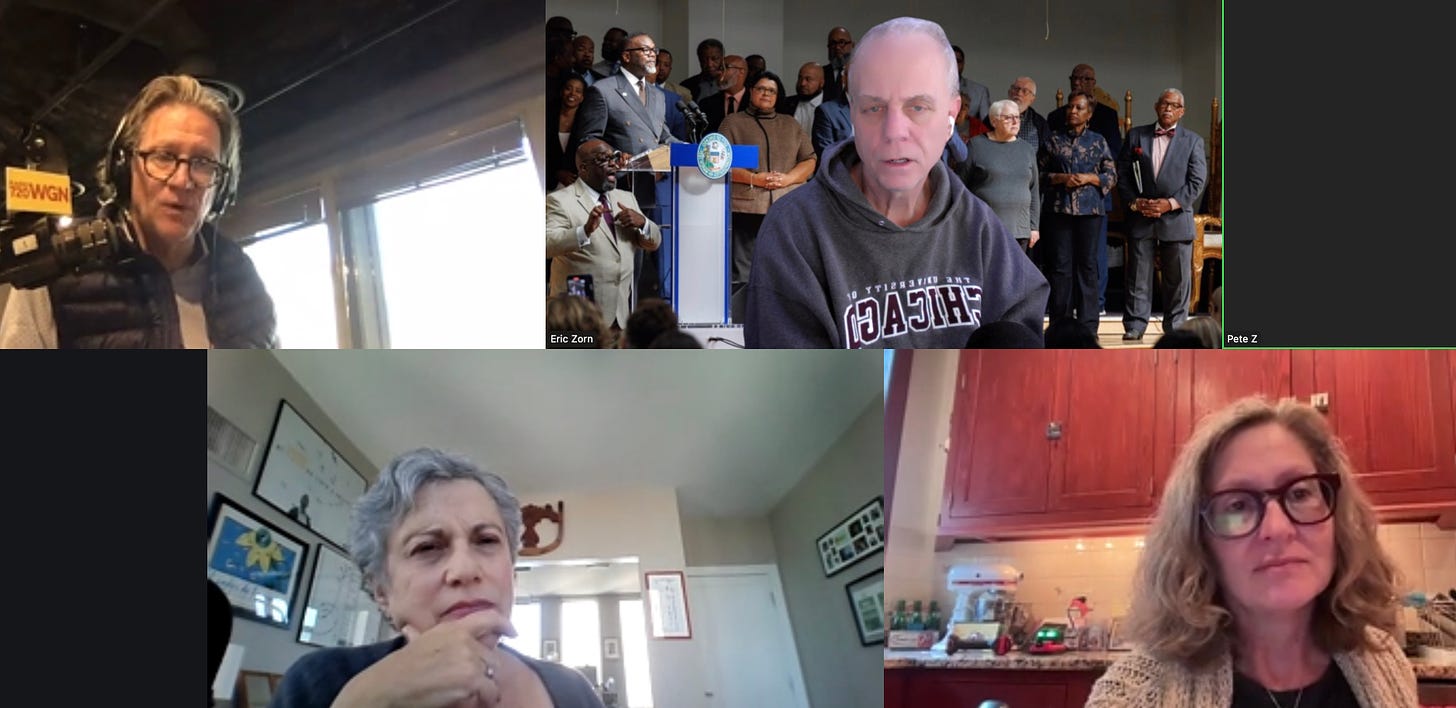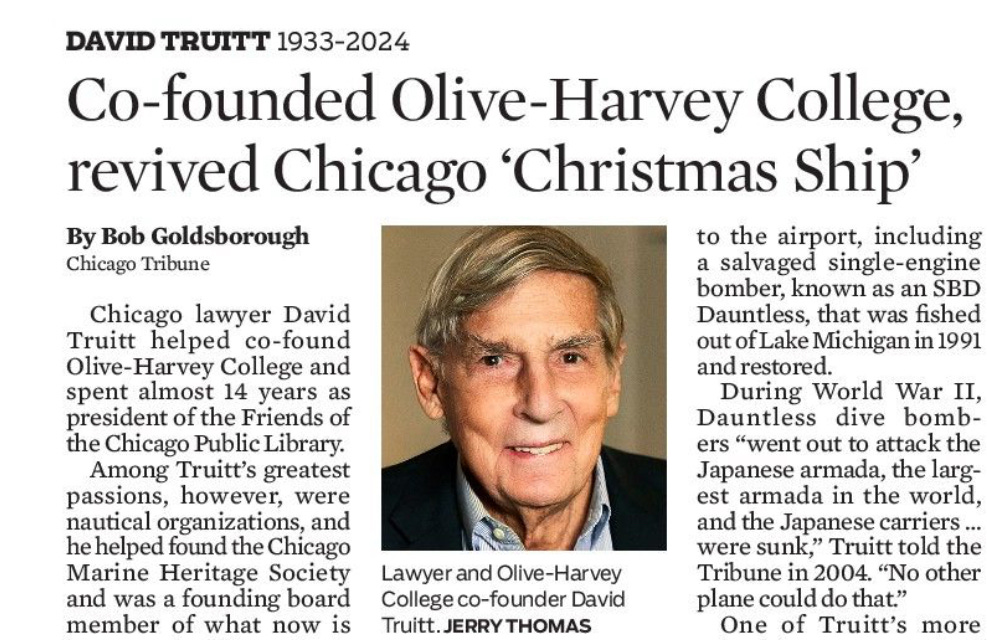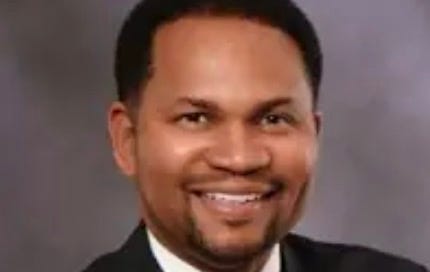Zorn: Which side are you on in the Chicago school board elections?
Difficult choices face those who want truly independent representation
10-10-2024 (issue No. 162)
This week:
I don’t want nobody somebody endorsed in Chicago’s first school board election — A review of the unfolding chaos
Yes, a 10/7 license plate is offensive. No, Illinois should not ban it
Land of Linkin’ — Where I tell readers where to go
Squaring up the news — Where Charlie Meyerson tells readers where to go
The Sun-Times dropped its paywall two years ago, but was that a good idea?
The Sun-Times has shrunk its weather page — Good idea, I say
Steve Chapman’s regrettable defense of the Electoral College 24 years ago
Mary Schmich — A movable feast day?
Cheer Chat — An update on preparations for “Songs of Good Cheer”
Quotables — A collection of compelling, sometimes appalling passages I’ve encountered lately
Quips — The winning visual jokes and this week’s contest finalists
Good Sports — What’s with the new logo on MLB helmets?
Tune of the Week — “The Christmas Ship” in honor of the late David Truitt
Eric Zorn is a former opinion columnist for the Chicago Tribune. Find a longer bio and contact information here. This issue exceeds in size the maximum length for a standard email. To read the entire issue in your browser, click on the headline link above. Paid subscribers receive each Picayune Plus in their email inbox each Tuesday, are part of our civil and productive commenting community and enjoy the sublime satisfaction of supporting this enterprise.
Chicago school board elections: I don’t want nobody somebody endorsed
I’m a big admirer of teachers and a long-time backer of organized labor, so under normal circumstances I’d be voting for and rooting for candidates backed by the Chicago Teachers Union for seats on Chicago Board of Education.
But now that the CTU has such a strong advocate in the mayor’s office — Brandon Johnson, a former organizer for the union that bankrolled much of his campaign in 2023 — and seems blithely dismissive of taxpayer concerns about how the schools will pay for their raft of contract demands, I’m tempted by the idea of voting for a balance of power.
Yes, Johnson and his union allies will control the board after a hybrid board of 10 members are elected by the public next month and 11 members (including the chair) are appointed by the mayor. That board is likely to rubber-stamp Johnson’s wish list for schools, including a high-interest $300 million loan to cover costs associated with the new contract and proposed additional staffing, so there won’t be enough balance.
But I’m deeply suspicious of those candidates endorsed by the Illinois Policy Institute and other groups that want to direct public money to private education in the name of “school choice” and promote charter schools over neighborhood schools in an effort to dilute union power.
CTU endorsed candidates:
District 1: Jennifer Custer
District 2: Ebony DeBerry
District 3: Jason Dones
District 4: Karen Zaccor
District 5: Aaron “Jitu” Brown
District 6: (two endorsements) Anusha Thotakura and Brenda Delgado
District 7: Yesenia Lopez
District 8: Felix Ponce
District 9: Lanetta Thomas
District 10: Robert Jones
Illinois Policy Institute endorsed candidates
District 1: Michelle Pierre *
District 2: Bruce Leon
District 3: Carlos Rivas*
District 4: Ellen Rosenfeld
District 5: No endorsement; only one candidate running
District 6: Andre Smith*
District 7: Eva Villalobos*
District 8: Angel Gutierrez*
District 9: Miquel Lewis*
District 10: Karin Norington-Reaves*
*Also backed by the super PAC of the Illinois Network of Charter Schools.
There are more than two candidates in six of the 10 districts but not mine (District 1). Chicago voters should look at the Sun-Times voter guide or the Block Club Chicago voter guide to sift through questionnaires and pick their poison, though it would be unusual for any candidate to admit in questionnaires to being beholden to an interest group.
Meanwhile, voter interest in these races seems quite mild to judge from these photos from candidate forums cribbed from news sources for illustrative purposes:
Outside money is coming into these races as interest groups jockey for position. See Chalkbeat Chicago’s story last week, “Pro-school choice super PACs nearly double the money spent so far in Chicago’s first school board elections.”
The super PAC of the Illinois Network of Charter Schools poured more than half a million dollars into Chicago’s school board elections in the past week, nearly doubling the total money flowing into these historic races so far. …
In what the charter advocacy group has described as an effort to counter the influence of the Chicago Teachers Union and a shift away from school choice in Chicago, the money will pay for digital ads and mailers supporting seven candidates and opposing one. … The wave of expenditures puts the charter advocacy group at the top of all special interest groups spending in Chicago’s first school board elections — more than double the $238,000 spent by the political action committees of the Chicago Teachers Union and a CTU-led coalition of community organizations.
The story notes that “candidates and political action committees are due to report all money raised and spent between June 30 and Sept. 30 by Oct. 15,” which should help us better see which candidates are on which side.
But we’re likely going to see a much greater influx of outside money when control of the board is actually in doubt in 2026 when the entire board will be elected.
I sounded the alarm about this in early 2021 in a column headlined “Nasty, expensive school board elections for Chicago? Hard pass”:
In the 2020 primary and general election cycle for just four seats in Los Angeles, the campaigns spent about $1.2 million to promote their candidates. But outside groups — largely dueling supporters of the charter school movement and of supporters of unionized teachers who tend to oppose charter schools — spent roughly $16.5 million, nearly 14 times that amount, to bombard the voters with propaganda.
The resulting board in LA now has a narrow advantage for charter proponents. But such a result would be far from guaranteed in Chicago, where the Chicago Teachers Union has in recent years demonstrated that it has considerable muscle to flex.
All that we could be sure of would be periodic epic mud fights between people from all over the country with competing philosophical interests in education policy and hopes of influencing how we run our schools. In the naive hope of giving interested local parents a “seat at the table” we would, like Los Angeles, give special interests from coast to coast a lever to yank on without definitive proof that students are better off when school boards are elected.
The need for a balance of views on the board of education was on full display this week at Johnson’s chippy news conference Monday morning and his appearance on WTTW-Ch. 11’s “Chicago Tonight” program Tuesday in which he showed no interest in compromising with those who want to impose fiscal discipline on a school system already awash in red ink.
If I’m faced with a decision to cut, to take away from families in this city, versus having to keep an option on the table where we might have to borrow some money to help connect us to full transformation, I know what decision I’m going to make. I’m going to make sure we invest in children and invest in the families of this city. I’m not going to cut, and take away, layoff, fire, privatize so that other people can benefit, and the people of Chicago can lose. Not on my watch.
Meanwhile, the idea of spending tax-increment financing funds on schools rather than development projects is gaining traction. The Tribune posted a thorough article on the idea Tuesday afternoon and Martinez promoted it Wednesday on “Chicago Tonight”:
Before Martinez publicly called for TIF funds to be used to balance CPS’ budget, CTU leaders called for all funds now set aside in TIF districts to be returned to taxing agencies, which would allow CPS officials to balance the district’s budget.
That would likely violate state law and upend Johnson’s already approved plan to phase out the city’s decades-long reliance on TIFs and use those funds for a wide-ranging slate of projects designed to expand the supply of affordable homes and good-paying jobs.
Since their creation in the mid-1980s, TIFs have been beloved by Chicago City Council members for providing a dedicated fund for a host of programs, ranging from road improvements to school additions and expanded park facilities.
It’s not free money, in other words. And prying it away from the alders who use it to fund often important projects will be particularly difficult given how blunt and clumsy Johnson has been with his my-way-or-the-highway governing style. As has been widely reported, 41 of 50 members of the council signed a statement of concern over the weekend about the power grab in which Johnson somehow secured the resignation of all seven members of the volunteer school board — members he appointed! — and began replacing them with presumptively more compliant toadies.
Then he compared those who questioned him with those who cited economic concerns when opposing the end of chattel slavery in the 19th century.
Wednesday’s council meeting was lit. Fran Spielman of the Sun Times reported:
Ald. Anthony Beale (9th) moved to defer all of the legislation Johnson introduced at Wednesday’s meeting to the Rules Committee. That adds another step to getting any of those items passed.
Beale wanted to get even with Johnson for canceling the ShotSpotter contract and defying two City Council votes aimed at compelling the mayor to reverse that decision and keep the gunshot-detection technology.
Johnson fought back by using his own parliamentary maneuver to overrule Beale’s attempted legislative detour.
An exasperated Beale once again accused Johnson of making up the parliamentary rules as he goes along.
If Robert’s Rules of Order are not followed, Beale asked, “What are we doing here? You may not like it. You think I like deferring this stuff? But you know what I don’t like [more]? Canceling ShotSpotter when people are dying on the damn streets.”
After another vote, Beale won the skirmish. The mayor’s introductions remain in the Rules Committee.
My view has become that, no matter how noble and righteous Johnson’s goals may be, he is simply not very good at mayoring.
He speaks like the activist he once was, with broad, aspirational strokes suffused with frustration and contempt for those who don’t see things his way. He invokes race at seemingly every opportunity, and while that is certainly a relevant topic, his focus on it tends to divide rather than unite.
The Sun-Times Editorial Board was harsh: “Enough of the self-inflicted CPS turmoil, Mayor Johnson.”
Johnson spoke Monday about “bold leadership ... that doesn’t nibble around the edges and look for incremental gain.” But incremental gain is often how change happens. Soaring rhetoric is one thing. Getting results is another. … Progressives aren’t the only ones who want the city to move forward. Not everyone who disagrees is, as the mayor suggested to (reporter Sarah) Karp, “mad” that he’s trying to fix the problems of the past.
The Tribune Editorial Board was harsher: “Mayor Brandon Johnson hitting new lows, one news conference at a time.,” addressing the mayor directly:
Your being mayor of Chicago does not instantly render all criticism of the officeholder racist. Being mayor of Chicago does not mean that anyone daring to question your actions should have to sit there and be accused of being some walking remnant of the Confederacy. …
We speak of ordinary Chicagoans, who may or may not have voted for you, who were hopeful you would grow in the job and moderate your scorched-earth rhetoric, but who are coming only now to see your capacity for digging in and causing chaos in a city those voters love. …
Monday’s press event …was a low point for you. Frankly, the whole staging felt like a strong-arm Soviet event, not a civic conversation about the education of Chicago’s children.
I let loose a bit myself in “You are embarrassing us and yourself, Mr. Mayor.”
Johnson frequently invokes the idea that the voters of Chicago gave him a mandate to make radical changes. That’s not true. A whisper over half of them — 52.2% — elected him, and many were simply expressing a preference for him over Paul Vallas, his headstrong, right-leaning challenger and a hope that he’d be true to his promise to be a collaborative leader.
Last week’s winning quip
I’m sorry, but you can’t *always* be experiencing a higher volume of calls than average. That’s not how averages work. — @Kit_Yates_Maths
Here are this week’s nominees and the winner of the Tuesday visual-jokes poll. Here is the direct link to the new poll.
Yes, a 10/7 license plate is offensive. No, Illinois should not ban it
A front-page story in Wednesday’s Tribune reports that “Democratic Illinois Secretary of State Alexi Giannoulias has revoked several vanity license plates “that display some iteration of the date ‘October 7’ after his office fielded complaints that one plate appeared to endorse last year’s attack on Jewish citizens.”
The story goes on to note:
Giannoulias’ office said state law allows the secretary of state to deny requests or revoke plates that “in the opinion of the Secretary, (1) would substantially interfere with plate identification for law enforcement purposes, (2) is misleading, or (3) creates a connotation that is offensive to good taste or decency.”
It quotes an office spokesman as saying that anything seeming to celebrate Hamas’ Oct. 7, 2023, terror attack on Israel that left some 1,200 Israeli’s dead and sparked a conflict that has killed a reported 41,600 Palestinians could reasonably be considered hate speech.
The American Civil Liberties Union of Illinois criticized the decision to remove the plates, saying it risks censoring political speech and calling the standard that the office used too vague.
“It raises a significant question about the infringement of someone’s political speech by a government official, simply because they don’t agree with the speech,” said Edwin Yohnka, director of communications and public policy for the ACLU of Illinois. …
The courts have weighed in on this issue, in one instance siding with a California man who won a federal lawsuit in 2020 against the head of the state’s Department of Motor Vehicles after the office denied the man’s application to get a vanity plate that included his Army nickname because the plate configuration “contained a gang reference,” court records show.
In his ruling, U.S. District Judge Jon Tigar wrote California’s prohibition on personalized license plate configurations “that may carry connotations offensive to good taste and decency” constitutes “viewpoint discrimination.” But Tigar also said his ruling does not prevent the DMV from banning certain words on certain license plates such as “(o)bscenity, vulgarity, profanity, hate speech and fighting words” that fall “outside the scope of the First Amendment’s protections.”
Celebrating a terror attack is repugnant and ghoulish, but, like burning an American flag in protest, it’s also pretty clearly a political statement; here one in sympathy with the aims of Hamas in the Middle East. And a license plate is pretty clearly a public forum, of sorts that, once the government creates it ought to be open for a wide variety of expressions, even those that many of us find politically objectionable to the point of bordering on hate speech, which the law generally allows.
Nobody thinks the state of Illinois endorses or celebrates the messages on license plates any more than it OKs someone’s “I Eat Ass” bumper sticker.
I’d suggest they just dump the whole idea and go back to randomly assigning plate numbers, but the revenue from custom plates is clearly irresistible. All states offer them, and Illinois levies a $94 first-time upcharge on some 280,000 all-letter vanity plates along with a $13 additional annual renewal fee, and a $47 first-time up-harge on about 532,000 personalized plates that include letters and numbers with a $7 additional renewal fee.
Your thoughts?
Land of Linkin’
An unnamed East Coast magazine commissioned Sun-Times columnist Neil Steinberg to review the latest book by Northwestern University curmudgeon Joseph Epstein, a friend of the editor who assigned Steinberg the review. The magazine then declined to publish Steinberg’s resulting tough evaluation, probably because it contained such passages as, “Epstein mourns the loss of the word ‘Negro,’ as ‘once a term of great dignity.’ Yes, and ‘idiot’ was once a neutral medical term. But times change. Epstein clutches at ‘Negro’ twice — manfully restraining himself from daubing a tear for minstrel shows — never devoting a second's thought to the churning racial dynamics that drive such changes.”
As I’d hoped and prayed, the confluence of Armitage, Elston and Ashland Avenues won the Axios Chicago bracket tournament for most annoying intersection in Chicago.
“Deeply researched and exquisitely written” is Rick Kogan’s assessment in “New book explores the life of Abe Saperstein, the Chicago dynamo who created the Globetrotters,” a review of Mark and Matthew Jacob’s just-published “Globetrotter: How Abe Saperstein Shook Up the World of Sports.”
Associated Press: “Trump has long blasted China’s trade practices. His ‘God Bless the USA’ Bibles were printed there.”Trump is charging $59.99 for Bibles with an estimated value of “less than $3 per Bible, according to databases that use customs data to track exports and imports.” The story adds that “the Bible includes copies of the U.S. Constitution, Declaration of Independence, Bill of Rights and Pledge of Allegiance” which — what a coincidence! — neatly matches “Oklahoma’s plans to spend $3 million on Bibles (for public schools) that initially matched Trump’s edition: a King James Version that contains the U.S. founding documents.”
One of my new favorite fiddle tunes is “Lord Harry’s Hornpipe,” which was once “a tune known to all old time fiddlers in eastern Indiana and western Ohio” according to a 1944 issue of California Folklore Quarterly. Local folklorist — and member of the Songs of Good Cheer band — Paul Tyler exhumed this tune and wrote extensively about the composer at Dr. Dosido’s Blog, his Substack.
New York Times (gift link): “Trump’s Speeches, Increasingly Angry and Rambling, Reignite the Question of Age: With the passage of time, the 78-year-old former president’s speeches have grown darker, harsher, longer, angrier, less focused, more profane and increasingly fixated on the past, according to a review of his public appearances over the years.”
Steve Chapman: “Kamala Harris claims the cause of freedom.” “Harris, unlike Trump, is not obsessed with using presidential power to persecute critics, overturn elections, stamp out peaceful dissent, replace legions of civil servants with rabid loyalists or act as a dictator on Day One. Trump is an unabashed authoritarian, and authoritarianism is anathema to liberty.”
Squaring up the news
This is a bonus supplement to the Land of Linkin’ from veteran radio, internet and newspaper journalist Charlie Meyerson. Each week, he offers a selection of intriguing links from his daily email news briefing Chicago Public Square:
■ Gerontology professors explore Kamala Harris’ proposal—outlined on ABC’s The View—to allow Medicare to expand home healthcare coverage for older Americans.
■ “Not qualified”: As Illinois bar associations’ ratings of the judicial candidates seeking retention on the November ballot continue to trickle in, the Chicago Council of Lawyers turns thumbs-down on four.
■ Early voting for the November election’s begun in Chicago. Which means it’s time for the Square Voter Guide Guide.
■ “So what?” That’s what a newly unsealed court filing in the landmark criminal case against Donald Trump quotes him as saying after an aide told him during the insurrection of Jan. 6, 2021, that Vice President Pence’s life was in jeopardy.
■ The Daily Beast: The release has Trump “absolutely fuming.”
■ The Intercept spotlights “the law school dean who quietly worked to overturn the election.”
■ Popular Information: A Trump campaign contest to let someone join him onstage in Pennsylvania over the weekend sure looks to have been a scam.
■ Press Watch columnist Dan Froomkin: “The New York Times … has created a permission structure for others to … address the issue of Trump’s mental fitness.”
■ Pod Save America host Dan Pfeiffer analyzes the mainstream media’s “fuming” over the Harris-Walz campaign’s media strategy.
■ CNBC: Trump election conspiracist Tina Peters has been sentenced to nine years in prison by a Colorado judge—who threw the book at her, as seen in this video.
■ The Lever: Even as Hurricane Milton menaced their state, Florida Republicans aimed to block a climate emergency declaration.
■ PolitiFact: An image of a little girl in a boat clutching a puppy amid rain and floodwaters, her face contorted in sorrow, is an AI fake.
You can (and should) subscribe to Chicago Public Square free here.
So what did happen?
The headline on Sunday’s article by Sun-Times Executive Editor Jennifer Kho read, “Two years ago, we stopped charging readers for Sun-Times stories online. Here's what happened.”
For years, readers had to pay if they wanted to read the Sun-Times, whether in print or on our website. But two years ago, after the Sun-Times became a nonprofit as part of Chicago Public Media, we made it free for everyone to access all of our stories online. It was a risk: Would we be able to support ourselves without a paywall?
As a reader and supporter of the Sun-Times, I’m curious how the experiment is going. Is donation revenue keeping up with expenses? What will happen when the $61 million in philanthropic donations that facilitated the merger of the Sun-Times and WBEZ-FM runs out after five years? The Sun-Times reported in January 2022:
With the closing of the noncash sale of the Sun-Times to Chicago Public Media (WBEZ-FM), the newspaper becomes a nonprofit for the first time in its history. Executives said the philanthropy is pledged over five years and will help the Sun-Times broaden its reporting, expand digitally and maintain its print product.
The paper reported in April of this year that the John D. and Catherine T. MacArthur Foundation had contributed $10 million toward the 2022 merger, and that Chicago Public Media was laying off staff even though its investment portfolio had grown to $74.1 million in the previous fiscal year.
Kho’s column did not address the “what happened?” question other than to cite 34 instances of creditable journalism. So I wrote to ask her if she could offer some enlightenment regarding the fiscal question.
“I'm not authorized to speak publicly about revenue,” she responded, and passed me along to the person who handles press inquiries.
Weather or not?
I also asked Kho about reader objections to the paper halving the size of its weather page started a week ago Wednesday.
“Really?” said one published letter to the editor. “Chicago is a weather town. … The reduction of the weather page … is another reason newspapers are becoming irrelevant in our great city. Remain relevant and restore the full weather page before I cancel my subscription.”
“It may seem old fashioned, but the weather page is actually an integral part of our family’s daily Sun Times reading experience,” said another letter. “Weather is about as local and universally relevant as a topic can get. Please reconsider this decision and bring back the weather map and data.”
Thing is, newspapers have long been moving away from providing information that’s easily available on your phone or online: stock tables, for instance. Movie theater schedules. TV grids. Up-to-date weather information — as opposed to weather information assembled the night before — is exceedingly easy to find.
Wanna know the forecast for Fargo, for instance, as seen in the image on the left above? Ask Siri, Alexa or the digital assistant of your choice. If a newspaper isn’t offering you information and detail that’s harder or impossible to get elsewhere, it’s writing its own epitaph.
And yes, columns about the card game of bridge are hard to find — The New York Times bailed out more than 9 years ago — but don’t strike me as a feature that will attract a new generation of readers, let alone paid subscribers.
Will the paper knuckle in to these complaints and restore the full-page weather feature? Kho did not respond to this particular query, but I hope not.
Regrettables: Steve Chapman’s defense of the Electoral College
I put out the call a while back for my current and former siblings in punditry to send along columns they particularly regret having written. My former colleague Steve Chapman submitted this from Nov. 16, 2000, written while the nation was watching presidential votes in Florida for Democrat Al Gore and Republican George W. Bush being recounted and the Electoral College victory hung in the balance:
Chaos, confusion and other glories of the American System
In the time since the presidential election, critics have been charging that our system of government and elections is an antiquated, fragmented, irrational and sometimes undemocratic contraption guaranteed to frustrate anyone looking for clear, speedy implementation of the will of the people. Well, it is. You got a problem with that?
Right now, of course, the nation and the world are presented with what looks like mindless chaos. The biggest vote-getter may lose, the outcome may be determined by ballot designers, and we not only don’t know the winner–we don’t even know when we will know.
Chaos this may be, but mindless it isn’t. The American republic is not a sleek, efficient machine that infallibly converts popular sentiment into government policy. That’s because it is not supposed to be. Just the reverse, in fact.
From the federal government down, our system incorporates a variety of mechanisms that are meant not to facilitate action and empower the people, but to prevent action, slow things down and ward off the excesses of popular rule. The founders of the republic were familiar with efficient government: They knew it as monarchy. And they had deep reservations about democracy, which they feared would degenerate into tyranny by the majority.
So they didn’t want too much efficiency or too much democracy. The institutions they created were designed so it wouldn’t be easy for anyone, elected or electorate, to get things done. The government had limited powers, spelled out in the Constitution, and those powers were divided among three branches of government.
Countries like Britain, which operate on a parliamentary system, can have an election one day, a new government the next, and a 180-degree change of policy the day after. Americans, by contrast, do not expect instant gratification in the political sphere.
Here, the president-elect has to wait two and a half months just to take office, and he can implement much of his agenda only if he can get consent from Congress–which may be controlled by the party he just defeated in the presidential race. He is checked by Congress, Congress is checked by him, and both are checked by the courts–which in turn are checked by both of the other branches. There is no such thing as unbridled power in our system.
Besides being contained by checks and balances, power is not concentrated in one place but scattered among thousands of government bodies from coast to coast. We have an electoral college, which can deprive the people of their choice for president, because ours is not a single democracy but a collection of democracies. We are the United States of America, not the United People of America.
So some powers, like supervising elections, reside at the state level, while others are lodged in Washington. This prevents either the federal government or its state counterparts from having too free a hand. As the Supreme Court put it in a landmark 1995 decision, “A healthy balance of power between the states and the federal government will reduce the risk of tyranny and abuse from either front.”
The electoral college, like the United States Senate, is a check on the power of large states to impose their will on small states. It encourages presidential candidates to heed not only the desires of people living in New York and Chicago but those living in Las Cruces and Cedar Rapids.
Without devices like these, states would be weaker and less able to resist the centralizing impulses of the federal government. They would be little more than administrative vestiges, as puny and superfluous as an appendix.
As James Madison wrote in the Federalist Papers, the founders had a clear idea how to prevent oppression and injustice: “Society itself will be broken into so many parts, interests and classes of citizens that the rights of individuals or of the minority will be in little danger from interested combinations of the majority.” Bad people or bad causes might come to dominate one level or branch of government, but like Gulliver being restrained by the Lilliputians, they would find themselves foiled by a multitude of tiny obstacles.
So what looks like a senseless Rube Goldberg scheme that merely complicates things which ought to be simple is actually a sensible Rube Goldberg scheme that serves reliably to protect our liberties. And if, this one time, it also means that the next president may not be known for days or weeks and may be unable to do much of anything once he takes office–well, just consider that a bonus.
Update
Twelve years later to the day, Chapman wrote a column in which he took the opposite view. It said, in part:
Citizens cast presidential ballots according to individual preference, not state interests. Voters in Detroit don’t vote to uphold the interests of rural residents of the Upper Peninsula, or vice versa. Kansans and Nebraskans do not see their needs as starkly different. We’re all Americans, first and foremost.
“It forces candidates to pay attention to states they would otherwise ignore.” True. It does so by forcing them to ignore other states — most of them. Only eight states saw Obama during the general election campaign, notes Edwards, and only 10 got visits from Romney.
“Without it, we’d face frequent massive recounts, multiple parties and narrowly based candidacies.” Really? You’d never guess that we use simple majority rule in our other elections, without those awful consequences.
Senate races rarely generate vote-count disputes. Third parties hardly ever affect congressional elections. Candidates for governor campaign in rural as well as urban areas.
The Electoral College is a strange mechanism, created to avert imaginary dangers, that violates basic democratic principles for no good reason.
Previously featured regrettable column:
Eric Zorn: “Nothing smart about smart cars.”
Mary Schmich: Heresy!
My former colleague Mary Schmich posts occasional column-like entries on Facebook. Here, reprinted with permission, is a recent offering, posted one week ago:
Today is October 3, a date that’s seared into my brain as clearly as my birthday.
My feast day!
My middle name is Theresa. I was named after St. Therese of Lisieux, aka The Little Flower. Never mind that I wore the Americanized version of the name—with an “a”, not an “e” at the end.
God protect anyone who confused my name with that other Teresa, the “h”-free St. Teresa of Avila.
My name had an “h”, dammit, and my feast day was October 3.
And to this day, whenever I hear “October 3,” I hear “Good Vibrations.”
On October 3 of my eighth grade year—1966?— my mother promised me a feast day present. The 45 rpm of my choice. A few days later, she took me to the store and I picked out the most exciting record I’d ever heard, the first record I ever owned:
“Good Vibrations” by The Beach Boys.
After inscribing my name on it--a vital part of the record-owning ritual--I played it approximately 6 million times.
In all my moving around since then, I’ve hung on to it, and it lives on the top of a stack of scratched 45’s I keep in a corner of my living room hutch.
So this morning, I grabbed it from the stack, thinking it would make a fun Facebook post. But even Facebook posts should be fact-checked—yes, JD, fact-checking matters—so I Googled Oct. 3 and my patron saint.
And made a shocking discovery!
October 3 is no longer my feast day. In 1969, the Catholic Church moved St. Therese/a’s special day to … October 1!
Heresy.
It’ll always be October 3 to me. And I still think “Good Vibrations” is one of the greatest songs ever written.
Cheer Chat
An update on preparations for the 26th annual Songs of Good Cheer winter holiday sing-along programs at the Old Town School of Folk Music.
Scheduling conflicts prevented us from holding an in-person meeting Sunday so we Zoomed in Tuesday afternoon to discuss what new material we might do this year.
We’re seriously considering having Steve Rosen channel his inner Elvis Presley for “Santa Bring My Baby Back (To Me),” which shares quite a bit of musical DNA with “Don’t Be Cruel.”
For the 26th year, Mary Schmich and I will be hosting and playing along with an all-star band of local musicians who will lead the audience in seasonal songs — some very familiar, others far less so. We’re dusting off the hauntingly beautiful “Huron Carol” again this year, for instance.
Join us! Shows are Dec. 12-15, and tickets are now on sale online and at the Old Town School of Folk Music.
Minced Words
Host John Williams, Marj Halperin, Cate Plys and I started this week’s episode of “The Mincing Rascals” podcast talking about the musical ascendency of Cate’s future potential son-in-law Seb, whose viral hit “Seaside” launched his career three years ago. He will be performing Friday at 6 p.m. at the Cobra Lounge, 235 N Ashland Ave. Seb’s latest is “Last Great American Summer.”
We then talked at length about Chicago Mayor Brandon Johnson’s off-putting news conference Monday, then touched on the upcoming school board elections, hurricanes, and what should and shouldn’t be allowed on license plates.
Subscribe to us wherever you get your podcasts. Or bookmark this page. If you’re not a podcast listener, you can hear an edited version of the show at 8 p.m. most Saturday evenings on WGN-AM 720.
Read the background bios of some regular panelists here.
Happy ‘premium issue’ to those who celebrate
Sunday Tribune home delivery subscribers found this tucked into the giblets this week — it’s another one of the monthly, unlabeled “premium issues” for which the Trib effectively adds $9.99 to your subscription bill. The “premium issues” come at no additional charge if you buy the paper at a newsstand (for $5.75) or if you call the newspaper’s customer service line — 312-546-7900 — and ask not to be charged extra.
The operator will agree to your request, but only for six months at a time.
Quotables
A collection of compelling, sometimes appalling passages I’ve encountered lately
The lack of credibility from the Mayor's Office is striking. First, CPS resignations were just “rumors," then the entire board resigned. First, the hiring freeze didn’t apply to police, now it does. We can't address a massive budget deficit with a deficit of trust & honesty. — Ald. Bill Conway, 34th
I don’t give a shit about (Chicago Public Schools CEO Pedro) Martinez. … Not my monkey, not my circus — Ald. Jeanette Taylor, 20th, chair of the Chicago City Council’s education committee
(Chicago Mayor Brandon) Johnson is a pressure cooker of boiling grievance. — Neil Steinberg
(Chicago Mayor Brandon) Johnson’s move to pull the ShotSpotter plug was both mulish and foolish. — Chicago Tribune Editorial Board
Old age isn’t a battle. Old age is a massacre. — Philip Roth
Yes they can control the weather. It’s ridiculous for anyone to lie and say it can’t be done. — U.S. Rep. Marjorie Taylor Greene, R-Georgia.
What kind of a malignant narcissist ghoul sees a natural disaster as an opportunity to spread lies and misinformation? And what kind of a morally septic cult of personality posing as political party encourages that? People are hurting, for God’s sake. — Bradley Whitford
The only immigrants I have a problem with are the Musks. — Thelma Johnson
Here’s the brutal truth, MAGA: You scream “America First” but your actions show it’s really “Trump First.” You’d rather see the country burn than admit it’s doing well under anyone else. You’re allergic to facts, terrified of progress, and cling to a con man who sells you fear because he knows you’re too blinded by your own ignorance to question it. You call yourselves patriots, but real patriots don’t worship one man like a god—they fight for truth, for progress, for all Americans. Your whole movement is nothing but a fragile ego wrapped in a flag. — Agent Self FBI
We’re all used to Donald Trump lying reflexively, but intentionally spreading disinformation about a natural disaster while so many people are still suffering is truly a special kind of evil. — Andrew Weinstein
Quips
In Tuesday’s paid-subscriber editions, I present my favorite tweets that rely on visual humor. Subscribers vote for their favorite, and I post the winner here every Thursday:
The new nominees for Quip of the Week:
Dentist: How often do you floss? Me: I was raised in a working-class family… — @terrip38
The only club I’ve stepped foot in since I turned 30 is Sam’s. — @RiotGrlErin
My two-year olds have reached the age where they can remember when I’ve told them that we’ll do something “later,” and I don’t want to overstate it, but I’m pretty sure this is the worst thing that’s ever happened to me. — @aaronhoyland
Me: Is the natural state of the soul quiet or chaos? Taco Bell cashier: Look buddy, it’s transient, shifting like water. — @moutheaters
Why do we call tiny bags “baggies” but tiny boxes aren’t called “boxies”? — @MrGeorgeWallace
Shouldn't it have been called the not-answering machine? — @_NatalieWould
Everyone you meet is fighting a battle you know nothing about. Snoop around in their medicine cabinet for clues. — @JohnLyonTweets
My first rodeo and my last rodeo were the same rodeo. — @RickAaron
Sometimes I think about the guy at my poker table in Vegas whom the pit boss thought was too drunk. Security came over and asked him to say the alphabet starting with “M.” He replied: “Malphabet.” He was escorted out of the room. — @timjhogan
Diddy? My guess is yes. — @BettyBowers
Vote here and check the current results in the poll.
For instructions and guidelines regarding the poll, click here.
Why the new name for this feature? See “I’m rebranding ‘Tweet of the Week’ in a gesture of contempt for Elon Musk.”
Good Sports
Strauss test
If you’re watching the Major League Baseball playoffs, you’ll have noticed that batting helmets have “Strauss” written on them.
If you’re like me, you are slightly annoyed but not surprised to see more advertising creep and you are also wondering what or who the hell “Strauss” is. Do you know?
Last month, MLB announced a multi-year partnership with Strauss, a German apparel company, that will see the company's name and signature ostrich logo adorn batting helmets for the duration of the postseason. The ads measure five inches wide and nearly an inch tall and are on both sides of each player's helmet. MLB's agreement with Strauss runs through 2027. The company will have ads on helmets for all MLB postseason games and regular-season games played in Europe, and, starting next year, all minor-league games (regular and postseason)
Strauss has only been selling in the U.S. since 2023. The company’s offerings don’t seem to be particularly focused on athletic wear.
Speaking of those playoffs, I’m all in for my boyhood team, the Detroit Tigers, and would love to see them face the New York Yankees in the championship series, then the Dodgers in the World Series, where I will be at rooting odds with my sister-in-law and brother-in-law in LA.
Blue
Yeah, my Michigan Wolverines — reigning Division football champions! — are looking mediocre this season. They’ve tried three different quarterbacks, and none has looked particularly stellar. Their pass defense and offensive line are suspect.
Halfway through the season, the gridiron cognoscenti are seeing this 4-2 team finishing 7-5 or maybe even 6-6, given that the only currently unranked teams on their schedule are Northwestern and Michigan State.
I’m fairly serene about it. That victory in the national title game last January will sustain me through a few down years.
Tune of the Week
I’ve been opening up Tune of the Week nominations in an effort to bring some newer sounds to the mix. I’m asking readers to use the comments area for paid subscribers or to email me to leave nominations (post-2000 releases, please!) along with YouTube links and at least a few sentences explaining why the nominated song is meaningful or delightful to you. But this week, inspired by this obituary in the Wednesday Tribune —
— I’m featuring “The Christmas Ship,” a 1989 ballad by far west exurban Kaneville resident Lee Murdock that celebrates a sweet but tragic bit of local history:
Oh, Papa, come look! Oh, Mama, can you see? I’ve been waiting for so long for this to come to be. Oh, Papa, come look! Oh, Mama, can’t you see? Here comes the Christmas Ship with all the Christmas trees.
From a Tribune story:
Murdock’s song tells the true story of a schooner that brought Christmas trees to Chicago for years before sinking in November 1912. Despite the tragedy, the song ends on a note of renewal, recounting how the captain’s widow assumed responsibility for bringing trees to Chicago by boat herself.
From Christmasship.org:
Chicago's boating community reenactment of the olden days of the Rouse Simmons landing in Chicago is now portrayed by the U.S .Coast Guard Cutter Mackinaw. The trees are off-loaded from the Mackinaw by local youth volunteers … and loaded onto trucks for distribution to more than a thousand deserving families throughout Chicago,
From David Truitt’s obituary:
Truitt was chairman of the Chicago Marine Heritage Society and the Christmas Ship Committee, and in 2000 he marshaled volunteer groups, the Coast Guard and those overseeing Navy Pier to make the event happen, as a way to bring the wonder and joy of a decorated tree on Christmas morning to lower-income households.
Robert Bied, a member of the all-volunteer Chicago’s Christmas Ship committee, told me that the event is not a reenactment — some 1,200 trees purchased in Michigan with charitable donations are trucked to port, loaded on the Mackinaw and shipped across the lake. For this year’s 25th annual revival of the tradition, the trees will arrive on the first weekend of December (schedule of events).
Before Christmas every year, Murdock, who specializes in songs of the Great Lakes region, performs a Christmas Ship concert. This year, it will be on Dec. 14 at the Unitarian Church of Hinsdale, part of the Acoustic Renaissance Concert series.
The Picayune Sentinel is a reader-supported publication. Browse and search back issues here. Simply subscribe to receive new posts each Thursday. To support my work, receive bonus issues on Tuesdays and join the zesty commenting community, become a paid subscriber. Thanks for reading
Contact
You can email me here:
I read all the messages that come in, but I do most of my interacting with readers in the comments section beneath each issue.
Some of those letters I reprint and respond to in the Z-mail section of Tuesday’s Picayune Plus, which is delivered to paid subscribers and available to all readers later Tuesday. Check there for responses.
If you don’t want me to use the full name on your email or your comments, let me know how you’d like to be identified.
If you’re having troubles with Substack — delivery, billing and so forth — first try “Picayune Sentinel Substack help, Frequently Asked Questions.” If that doesn’t work, check out the Substack help page. An if that doesn’t work, shoot me an email and I’ll be happy to help.





























I’m a 1A absolutist. A vanity plate celebrating the pogram Oct 7 is repulsive. If someone wants to have a poster or bumper sticker celebrating the murder and rape of civilian Jews that’s free speech - the state doesn’t necessarily need to sanction it. Kristallnacht was Nov 9-10 —same scenario.
A Oct 7 plate is no different than one displaying a swastika.
Dave Truitt's contributions of time and practical knowledge to organizations that make Chicagoans' lives better were not limited to those mentioned in his long obituary. One of the others, another of those with a song at its heart (thousands of songs, by now) was Chicago Children's Choir (renamed Uniting Voices a few years ago). When it faced dire financial straits in the mid-1970s, Dave was one of the half dozen people who formed a fundraising board and worked with the group's founder and home church to develop a new, and potentially more robust governing structure. It worked, as tens if not hundreds of thousands of Chicago kids could attest.